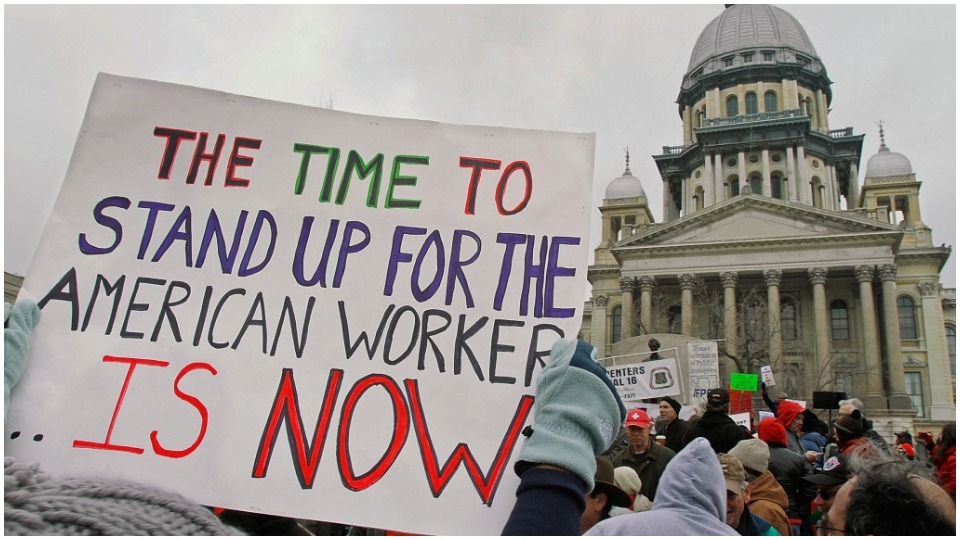On November 8th, voters will have the chance to enshrine protections against “right-to-work” laws in Illinois via constitutional amendment. Although Illinois has long been a blue state, the Workers’ Rights Amendment (WRA) would be a strong defense against anti-union laws.
Right-to-work, ushered in with the passage of the Taft-Hartley Act in 1947, allows employees to opt-out of paying union dues, while still enjoying the same union benefits as their dues-paying coworkers. While employers claim it’s about the “right to choose” and employee freedom, in practice it undermines union strength by imposing restraints on new organizing and collective bargaining.
The amendment would curtail efforts to impose right-to-work in the state, as former Illinois governor Bruce Rauner tried to do. Rauner unsuccessfully attempted to establish “right-to-work zones” in the state, entrusting local governments to litigate their own labor law. Not long after, his successor and current Illinois governor J.B. Pritzker signed the “Collective Bargaining Freedom Act,” banning local governments from adopting right-to-work laws.
“This is a time when we can and will take bipartisan action to lift up working families,” Pritzker told constituents at the bill signing. “The Collective Bargaining Freedom Act ensures that Illinois and all of its communities will never be a Right to Work state.”
Bordering states like Michigan and Wisconsin passed right-to-work laws in 2013 and 2015, respectively, while under Republican control. In Michigan, just prior to the passage of right-to-work, the United Auto Workers and a coalition of unions campaigned for a state constitutional amendment similar to WRA called “Protect Our Jobs.” That amendment was soundly defeated, and lended Gov. Richard Snyder extra political capital to pass right-to-work one month later.
In the South, unions are hoping to fend off right-to-work in Tennessee. If passed, Amendment 1 would make Tennessee the 29th state to establish right-to-work either by statute or constitutional provision. “It’s an attempt by corporations to rig our constitution like they have rigged our economy,” SEIU Local 205 Political Director Jason Freeman told More Perfect Union. “This is a top-down effort from the Republican supermajority to curb worker power when the labor movement is being re-energized by workers from Starbucks to Amazon.”
The Vote Yes for Workers’ Rights campaign, a group advocating for the ballot measure, is hoping to ensure Illinoisans avoid a similar fate. But this isn’t just an exercise in maintaining the status quo. Led by the AFL-CIO, unions from across the state are spending millions of dollars to support the amendment and sending their members door-to-door to discuss new labor organizing. UPS driver Sean Orr told me, “It would be a huge lift to pass [WRA] in the state, but we should also use it as an opportunity to talk to workers about organizing on the job, which could translate to activity in non-union shops.”
If WRA, which has a 60 percent threshold required to pass, succeeds, it could potentially defend the state against other anti-union legislation. Orr, also a steward with Teamsters Local 705 in Chicago, said, “We have to do everything we can to cement Illinois as a union state because we have seen what the assault on labor in neighboring states — where it was once unimaginable — has done. WRA can be a safeguard for workers in Illinois.”
It would also prevent the state from curtailing the ability of employees to collectively bargain for more than just wage increases and benefits — something labor activists in Illinois are worried about as expiration dates for several large public sector contracts loom.
Members of unions like the Chicago Teachers Union already enjoy the ability to negotiate over things other than wages and benefits, like class size, layoffs, and the duration of the school year under HB 2275. The law was signed by Gov. Pritzker despite protest from Chicago mayor Lori Lightfoot.
West of Chicago, Alderman Dylan Parker stressed the importance of passing WRA for cities like Rock Island, which has a population of just over 35,000. “I’ve heard from workers, walked picket lines, assisted in organizing drives… I’ve done my best, from a policy perspective, to ensure workers get a fair shake, which ultimately benefits the city, too,” he said. “It is workers that grow our local economy — that buy houses and support local businesses — and the rights of workers to organize and collectively bargain facilitates this.”
Similar to Orr, Alderman Parker echoed the sentiment that you can never be too sure of worker’s rights in a country with historically low union density and an unrelenting ruling class. Considering the opportunity to become the first state to preempt right-to-work, he says, “American politics [has] become a playground for the ultra-wealthy. If elections and politicians can be bought, regular workers — like those I represent in Rock Island — need a mechanism to protect their rights.”



